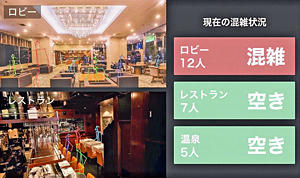3D camera-based system allows hotel guests to monitor crowd conditions from their rooms(客室で混雑確認 温泉旅館に3Dカメラ)

In a bid to help guests at hot spring inns avoid crowded areas and thereby prevent infections with the novel coronavirus, a system has been developed in which 3D cameras allow guests to monitor crowding from their rooms.
"We want to help support hot spring inns suffering from the coronavirus pandemic," an official of the development company said.
The system was developed by Aizu Computer Science Laboratories, Inc., in Aizu-wakamatsu, Fukushima Prefecture. The lab is headed by Masayuki Hisada, 45, a member of the first class at the University of Aizu, which opened in 1993 and specializes in computer science and engineering.
"I would like for people to visit hot spring inns with peace of mind" thanks to this system, Hisada said.
会津大発のベンチャーが、レストランなど温泉旅館の館内の混雑状況を3Dカメラで把握して宿泊客に知らせるシステムを開発した。新型コロナウイルスの感染防止対策として、同じ時間帯に客が集中することによる「密」を避ける狙い。混み具合は客室のテレビなどで確認することができ、担当者は「新型コロナの影響で苦しむ温泉旅館を応援したい」との思いだ。
開発したのは、会津大1期生の久田雅之さん(45)が所長を務める会津コンピュータサイエンス研究所(会津若松市)。久田さんは「宿泊客に安心して温泉旅館を利用してもらえれば」と開発意図を説明する。
In the system, 3D cameras are installed in places that could become crowded with guests, such as a restaurant or a lobby, to find out how many people are there at any given time, the distances between people, and the number of people going in and out. The system then uses artificial intelligence to determine the level of crowding.
Since it does not use infrared rays, it can also be used outside and in other locations where strong sun rays are present.
As for a public bath in an inn, 3D cameras installed at the entrance will evaluate how many guests are going in and out to determine whether the bath is crowded.
The number of people is shown on a TV screen in guest rooms along with video feed. When the number of people exceeds a certain level, the word "crowded" will be displayed.
レストランやロビーなど混み合う場所に3Dカメラを設置して、その場所にいる人数や人と人との距離、人の出入りなどを把握。人工知能(AI)が混雑状況を判断する仕組みで、赤外線を利用していないため、屋外など太陽光が強い場所でも使用できるのが特長。大浴場では出入り口に3Dカメラを取り付け、出入りする人数で混んでいるかどうかを調べる。
客室のテレビでは、人数を動画とともに見ることができ、人数が一定数を超えたら「混雑」と表示して注意を促す機能がある。
Another feature is the ability to display people as outlines or replace them with specific characters to prevent identification. Outlines are normally displayed in green, but as people get closer to each other, they turn red, and an automated voice will alert those who are too close to one another.
The installation cost of the system is several hundreds of thousands of yen. Aizu Computer Science Laboratories is exploring ways to reduce burdens on inns, however, such as exploring the possibility of a subsidy.
もう一つの特長は個人の特定を防ぐため、人を骨格で表示したり、指定のキャラクターに置き換えたりすることができる機能だ。骨格であれば通常緑色で表示するが、人と人の距離が近づくと赤色に変わり、その場所で自動音声で注意を呼び掛けることもできる。導入費用は数十万円で、会津コンピュータサイエンス研究所は補助金を活用できないかなど費用負担を軽減する仕組みを検討している。
Many hot spring inns in the prefecture now limit the number of guests to prevent crowded and close-contact settings. Harataki Konjakutei in the Higashiyama Onsen hot spring resort in Aizu-wakamatsu now only accepts 50% of the capacity of its guest rooms.
"We must come up with a mechanism that encourages guests to use facilities in inns at different times," said Harataki Konjakutei general manager Shigemi Hiraga, who is also deputy chairman of the Higashiyama Onsen Tourism Association.
"That would usher us into a new era of coexisting with the novel coronavirus," Hiraga said.
( Translated by The Japan News )
県内の温泉旅館には「密」を防ぐため客室の利用を制限する施設も多く、会津若松市東山温泉の原瀧・今昔亭は客室の受け入れを50%にとどめている。総支配人で東山温泉観光協会副会長の平賀茂美さんは「宿泊客に館内の施設の時差利用を促す仕組みが必要。新型コロナと共存する新たな時代への移行を後押ししてくれるシステムになる」と期待を込めた。
【 2020年7月20日付・福島民友新聞掲載 】
- Futaba Post Office reopens after 13 years(双葉郵便局、13年ぶりに再開)
- Craft sake brewery to make unmanned station more welcoming(無人駅の「クラフトサケ」醸造所がお出迎え)
- New Kitakata ramen developed to appeal to foreign tourists(訪日客向けの喜多方ラーメン開発)
- Aizu-Wakamatsu students come together with teahouse project(会津若松の生徒、茶室プロジェクトに集結)
- New hotel to be symbol of reconstruction(復興のシンボルとなる新ホテル)
- Radiation-resistant cameras to be produced in Fukushima(耐放射線カメラ、福島県で生産へ)
- International flights to Fukushima to resume after 13-year hiatus(福島の国際定期便、13年ぶり再開へ)
- Fukushima association to create base for parents of children with disabilities(障害児の親へ拠点作り)
- Real shell mound from Jomon period goes on display in Minami-Soma(南相馬で縄文のリアル貝塚展示)
- Japanese man opens restaurant to provide free meals to residents of war-hit Ukraine city(日本人男性が戦禍のウクライナに無料レストラン開店)